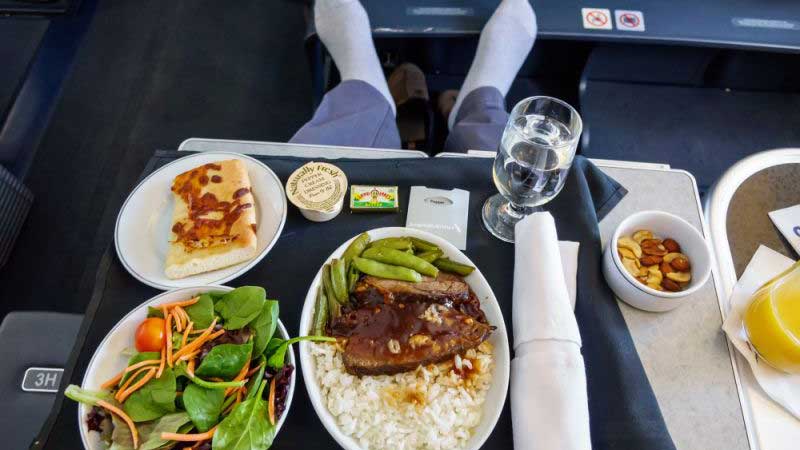 Traditional airplane snacks like pretzels just don’t cut it for Nikita Joshi, a 24-year-old biomedical engineer from Youngstown, Ohio.
Traditional airplane snacks like pretzels just don’t cut it for Nikita Joshi, a 24-year-old biomedical engineer from Youngstown, Ohio.
“I try not to eat a lot of gluten stuff. I’m not allergic,” she said, adding that she feels better when she avoids the “heaviness” of bread products and often just buys a fruit cup at the airport before a flight. She used to bring peanut butter cups but is concerned about passenger allergies to peanuts.
A shift in consumer preferences and diets toward options perceived as fresher, healthier and made with high-quality ingredients that have roiled the Big Food industry is now playing out on airplane tray tables at 36,000 feet, and airlines are scrambling to keep up. Carriers are hiring celebrity chefs, eschewing allergy-triggering peanuts and expanding their menus with gluten-free dishes, tastier vegan options and better ingredients to help build loyalty among picky travelers.
“Based on the number of requests we get you’d think 50 percent of people are gluten-free or vegetarian,” quipped David Rodriguez, who manages Alaska Airlines ‘ food and beverage service. The Seattle-based airline is considering adding gluten-free snacks like cookies or crackers but Rodriguez says it has to taste good and that the airline doesn’t want to “just have it to have it.” The airlines’ best seller from its on-board food cart is an $8.50 fruit-and-cheese plate.
Price is generally the most important factor when travelers select an airline, according to the International Air Transport Association, which represents most of the world’s airlines. But a recent survey found that on-board service, along with the boarding process, and baggage collection help drive passenger satisfaction with a carrier.
“We know that food and beverage make up a very small piece of the customer decision to purchase,” he said, adding that having food options on board drives an “emotional connection” to the airline.
Airlines have largely stopped serving packaged peanuts due to passenger allergies. Southwest Airlines became the most recent airline to take that step last month when announced it would stop serving peanuts on board.
“No airline wants to be responsible for a passenger having a terrible allergic reaction,” said Henry Harteveldt, who founded Atmosphere Research Group, a travel industry consulting firm.
Special requests
American Airlines and Delta Air Lines , the two largest U.S. airlines, each brought back complementary domestic coach-class meals last year, a perk they scrapped in the financial turmoil following the 9/11 terror attacks.
As airlines expand on-board dining, passengers are making special meal requests and airlines are tweaking menus to please travelers with more exciting vegetarian options, a move they appear willing to make as they enjoy the longest stretch of profitability in at least four decades.
“There is a cost to these items, but since they are for purchase and they are popular, overall it is easily justifiable,” Alaska’s Rodriguez said.
Vegetarian meals are the most popular special-request made to Delta, said spokeswoman Savannah Huddleston, followed by gluten-free, and such special meals now account for about 4 percent of the meals Delta serves.
That doesn’t mean there’s a surge in vegetarians. A Gallup poll this month showed about 5 percent of Americans consider themselves vegetarian, the same as in 2012, and about 2 percent consider themselves vegan, little changed from six years ago.
But airlines are still trying to keep up with vegetarian, low-carb and gluten-free trends. Delta started offering gluten-free snacks on board from Pretzel Perfection in 2016.
Pasta, a longtime fallback for meatless meals, is a tired choice for some vegetarians and isn’t gluten free. Plant-based dinners are one of the most popular specialty options, but they are among the trickiest. American Airlines said it has experimented with dishes like zucchini balls and stuffed mushrooms, said the airline’s head of food and beverages Russ Brown.
United Airlines has started using quinoa, faro and chia in some of its vegetarian meals and added snacks that aim to appeal to the carbohydrate-averse set like beef jerky and fruit and nut mixes.
Published in Daily Times, August 13th 2018.